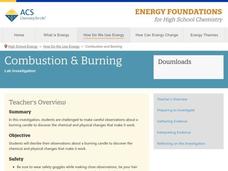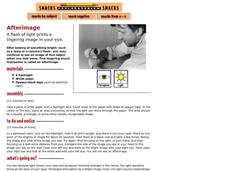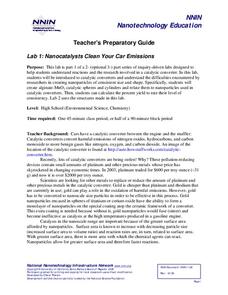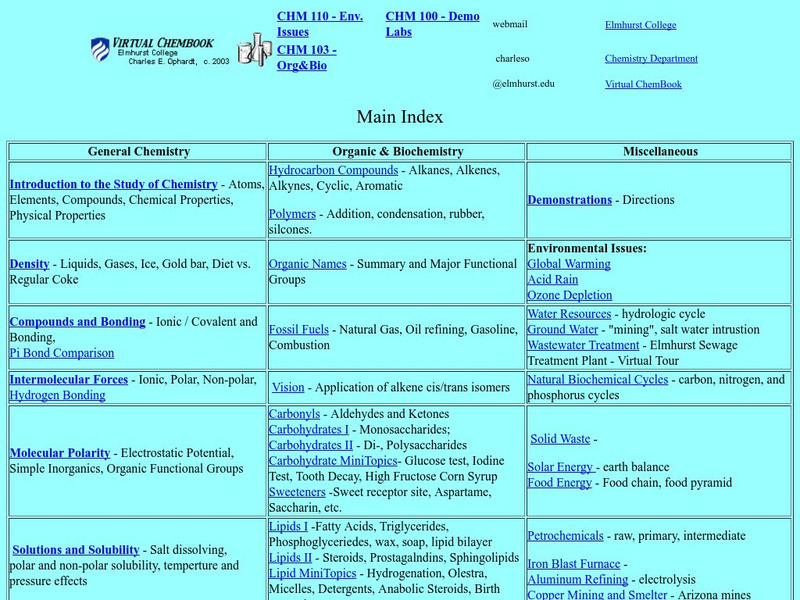Teach Engineering
Package Those Foods!
Designing the right package — it's more than a pretty picture. Challenge small groups to design a food package. They must consider the type of food they are packaging and the package's ability to control the physical and...
American Chemical Society
Entropy and Enthalpy Changes
My room isn't messy — it's a scientific experiment in entropy! Scholars investigate entropy, enthalpy, and spontaneity through a guided procedure and set of questions. The lesson connects the Second Law of Thermodynamics, energy...
It's About Time
Chemical Names and Formulas
Abracadabra! Provide your class with the tools to perform a chemical "magic show" as they predict the charges of various ions, determine ionic compound formulas, and make observations to determine when a chemical reaction between...
American Chemical Society
Combustion and Burning
On Earth, a candle flame points up, but on the International Space Station, it forms a sphere. Young scientists practice their skills by recording observations before, during, and after a candle burns. Chemical and physical...
Curated OER
Weathering Lab
Assist your middle school class with one of the most inclusive weathering and erosion labs available. Individuals use sugar cubes and alka-seltzer to demonstrate the process of physical and chemical weathering. They sketch results...
Exploratorium
Afterimage
To illuminate how afterimage occurs, create a star, square, or other geometric-shaped light for learners to look at for 30 seconds. Then, have them explain what they see as they shift their focus to a blank wall. A full explanation of...
National Nanotechnology Infrastructure Network
Lab 1: Nanocatalysts Clean Your Car Emissions
What a big job for such a small particle. Young scientists learn about the role of nanoparticles in catalytic converters for cars. They conduct an experiment to create alginate-MnO2 catalytic spheres.
What affects Frog metamorphosis?
In this lab, students explore pollutants which affect frog metamorphosis using household pollutants (vinegar, oil, and bleach) and sponge capsules.
Carnegie Mellon University
Ocean Acidification
After brainstorming what they know about ocean acidification, youngsters place eggs in acid to determine the effects on calcium-containing organisms, and add carbon dioxide to solutions with sea shell material to discover the impact on...
NOAA
Please Pass the Salt
Salinity is the focus of two experimenters that work to answer the question, How does salt change the physical properties of water? Super scientists compare the freezing rate of salt and fresh water, combine the two waters to...
Royal Society of Chemistry
Some Reactions of Carbon Dioxide—Microscale Chemistry
Precipitation reactions are always interesting. How about one that forms a precipitate using a gas? Chemists of any age will enjoy this twist on a standard solubility lab. Partners observe the lack of interaction between sodium...
Howard Hughes Medical Institute
Winogradsky Columns: Microbial Ecology in the Classroom
Winogradsky columns are ideal for observing the role of bacteria and other microorganisms in an ecosystem. This student activity guide is complete with data tables for observations and analysis questions for processing what was observed....
What happened to the frogs?
Students will select ten rubber frogs and determine their pollutant source based on their malformations. Students will write a brief essay on their findings. Students will be engaged in the lesson the entire time!
Malibu High School
Create a Game – Extra Credit Chemistry Project
What a fun way to review the year's learning! Working in small groups, learners select a major concept covered in class then create a game about it. The type of game is up to each group, but the expectations of what should be included...
NOAA
Climate Is Our Friend…Isn’t It?: Make an Extinction Polyhedron
Climate affects populations in different ways. Scholars research extinct organisms and mass extinctions in part three of the 10-installment Discover Your Changing World series. They create graphic organizers, then fill in the...
Exploratorium
Your Sense of Taste
A simple and sweet activity shows students how important smell is in interpreting flavor. Pairs of pupils hold their noses and eat Life Savers®, only to find that they can't identify the flavors until they let go. You will appreciate...
NOAA
It All Runs Downhill
Examine how pollution makes its way into an ocean with help from a model watershed. Scholars use household items to recreate a mini-watershed, equipped with pollutants, that when mixed with rain drain into a model's body of...
Teach Engineering
Making Model Microfluidic Devices Using JELL-O
Nothing flows like J-E-L-L-O! In the final portion of a four-part series, pupils create scale models of microfluidic devices out of gelatin and bendable straws. They use their devices to test various flow rates in the delivery of...
Other
Elmhurst College: Virtual Chembook: What Are Physical Properties and Changes?
Brief descriptions of physical properties, physical changes, and the process of sublimation. The three states of matter, melting point, and boiling point are described. There is one link on the page, which leads to an explanation of...


















